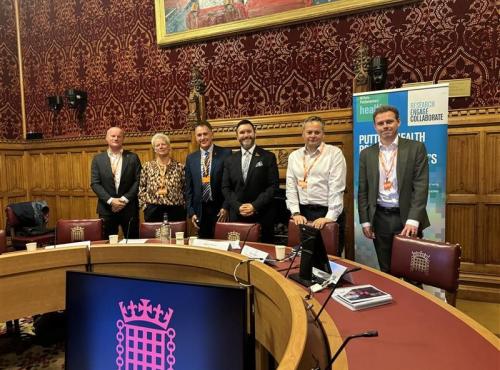Why the Health and Care Bill must be fully scrutinised by MPs and Peers, from Lord Patel of Bradford
The Government’s new Health and Care Bill represents the biggest changes to the health system in almost a decade. It aims to support the delivery of more integrated and joined up services for NHS patients.
In “normal times” such changes would require significant debate to ensure they will work in the best interests of patients and deliver value for money for the more than £120bn the NHS spends every year.
But given the events of the last year and the unprecedented strain the Covid-19 pandemic has put on health services, it is absolutely critical that the Government’s reforms are given the fullest possible scrutiny by MPs and Peers.
At the heart of the Bill is putting Integrated Care Systems (ICSs) on a statutory footing - abolishing the 200+ Clinical Commissioning Groups (CCGs) and handing over their planning, contracting, and financial allocation powers to around 42 ICSs. These new systems will be comprised both of an Integrated Care Board (ICB) which will take on CCG responsibilities and will include representatives from NHS Trusts, general practice, and local authorities. And alongside the ICB there will be an “Integrated Care Partnership” (ICP) which will bring together NHS organisations, local government and other health and care stakeholders and which will be “tasked with developing a strategy to address the health, social care and public health needs of its system”.
These proposals to better integrate care are undoubtedly the right thing to do. Anyone who has come into contact with the NHS, particularly if you have a chronic condition, knows how frustrating it can be when services don’t join up: when your patient records haven’t been shared with your hospital consultant, so you have to repeat your story numerous times; or when you have multiple appointment letters even though you would be happy to manage everything online, like many people do with every other aspect of their lives.
But while integration is undoubtedly the right ambition, by giving providers a greater role in commissioning and rolling back the “purchaser/provider” split that has been a characteristic of the health service for the past 30 years, ICSs will bring new challenges.
A key benefit of the changes is that this “system” will help ensure that organisations work together as a whole and consider the impact on the entire local health system when making decisions. However, by blurring the lines between who is procuring a public service and who is being paid to deliver it, there is a real danger that decisions by ICSs – who will likely be led by acute NHS provider organisations - could be taken to benefit providers rather than patients, with limited due process and transparency over quality.
As the Nuffield Trust and the Health and Social Care Committee have warned, this could lead to the emergence of “cosy local monopolies” where incumbent providers are favoured at the expense of the voluntary sector or innovative external providers – whether from the NHS or the independent sector. Ensuring the Bill and its accompanying guidance contain robust mechanisms to manage conflicts of interest and ensure decisions taken by ICSs are in the best interests of local populations are therefore going to be vital.
Why is this important? We know from experience that an NHS dominated by large unresponsive provider organisations, as they were in the 1970s, will not deliver the kind of health service fit for the 21st century that treats patients as having agency in their own care and in the design of the NHS’ services.
This is vital. The response to the pandemic has clearly shown that the NHS is a system of interconnected pieces - including local government, community pharmacies, the voluntary sector, social enterprises and independent sector providers – and not simply a set of public sector NHS organisations. This is particularly true in the community and mental health sector which contains a diverse range of providers. And with rising demand for health and care services, not just due to the pandemic but also as a result of demographic pressures as well, we are absolutely going to need an “all hands on deck” approach to getting the health service back on track and making use of all available resources in our healthcare communities.
There’s been significant debate about the new powers of the Secretary of State in the Bill (which will of course need looking at closely), but perhaps the biggest area where scrutiny of the Bill is needed is around how will it support the NHS to get services back on track post-Covid, and notably to clear the ever-growing elective care backlog that has emerged from the pandemic. Polling has consistently shown that tackling the growing backlog of elective care is the public’s number one priority for the NHS and will be an issue which will without doubt dominate political and health debates in the years to come.
A record 5.1 million people are now waiting for NHS elective treatment – a number which is set to significantly rise as Covid restrictions ease and the 6 million+ “hidden waiters” who would ordinarily have sought treatment come back. Tackling this backlog of care will likely take at least five years to resolve and the public will not forgive us if we spend the next year “reorganising” the NHS but failing to improve their ability to actually get the care they need.
Much of the debate around these reforms is around “undoing the Lansley act” or simply a “tidying up” exercise that MPs and Peers need not be worried about. But the pandemic has shown us just how important the NHS is to the health and security of this country. A lot is at stake in these changes, and it is vitally important that there is proper scrutiny and debate in both Houses over these changes, with a clear focus on tackling the elective care backlog and ensuring ICSs are open, inclusive and accountable organisations working in the best interests of local populations.
Lord Patel of Bradford
Photograph: official portrait, used under license CC BY 3.0.




